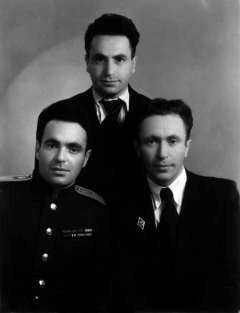Aron Skir was born in 1913 in Vilna (Vilnius, present-day Lithuania). His parents, Yakov ben Mordecai and Rakhel, were natives of Radun, a shtetl on the Lithuanian-Belorussian border. Yakov had studied at the renowned Radun Yeshiva, receiving a rabbinical ordination from the famous Jewish religious thinker Israel Meir HaKohen, commonly known as Hafetz Chaim. During World War I, the family moved to Minsk, where Aron and his three brothers grew up. The family was religiously devout, and Yakov was repeatedly dismissed from work (clerical service) for his refusal to work on Saturdays. The young Aron attended a kheyder, then studied at the Minsk Yeshiva until its closure by the Soviet authorities in 1929. In 1931, he went to study at the Leningrad Artistic Polytechnicum, but quit it. He then worked at a Leningrad shipyard, before enrolling in the Department of Philology of Leningrad State University in 1935. Only by the late 1930s did Aron become fluent in Russian, getting rid of his Yiddish accent. He graduated from the University in 1940, having specialized in French literature, and was sent to work in Arkhangelsk, North Russia.
Aron's brief stint at the Arkhangelsk Teachers' Institute ended with his being drafted into the Red Army in November 1940. He served on the border with Norway, in the subarctic region. At the beginning of the Soviet-German war in June 1941, he held the rank of technician-intendant first class (equivalent to senior lieutenant). In July, Skir became involved in frontline combat. His regiment suffered heavy losses, and his own life was saved only thanks to his proficiency in multiple languages, which got him transferred to the HQ of the Soviet 14th Army as an interpreter in August 1941. After this transfer, he never took part in combat, and ended the war without a single wound.
Skir served at the intelligence department of the 14th Army HQ. In this capacity, he interrogated enemy POWs; perused captured enemy documents; analyzed and summarized the gathered intelligence. Skir was awarded the medal "For Battle Merit" (in November 1942), as well as the Order of the Patriotic War, 2nd class (November 1944), and the medal "For the Defense of the Soviet Polar Region". Aron Skir finished the war in the rank of captain.
Skir's brother Samuil (Shmuel), born in 1919, was drafted in August 1941 as a military surgeon. In December 1941, he was attached to the medical-sanitary battalion of the 348 Rifle Division, with which he was sent to the defense of Moscow. In 1943, Medical Officer 2nd Class (equivalent to captain) Samuil Skir was awarded the Order of the Red Star; in 1944, he was awarded a second Order of the Red Star; finally, in 1945, Samuil Skir (who was by then major of the medical service) was awarded the Order of the Patriotic War, 2nd class. Aron's other brother, Hirsh Skir, was drafted into the Red Army in 1941, being attached to a communications platoon of the 349th Guards Rifle Regiment of the 105th Division. During his service, he was seriously wounded. By 1945, Guards Sergeant Hirsh Skir had been awarded the medal "For Courage" and the Order of the Red Star.
After the war, Aron Skir returned to Minsk, only to discover that his parents had been shot by the Nazis during the occupation. Until his retirement in 1990, Aron Skir was a lecturer at the Minsk Institute of Foreign Languages, where he taught a course on foreign (i.e. non-Russian) literature, and at the Minsk Institute of Theater, where he delivered a course in aesthetics to prospective actors and stage directors. Despite his status, Skir would always take part in the annual memorial gathering at the "Minsk Pit"– the site of the great Nazi massacre of Jews on March 2-3, 1942 (Although the postwar Minsk Soviet authorities refrained from demolishing the memorial at the Pit, their attitude toward these gatherings was hostile). Despite being a Party member, Aron Skir celebrated all Jewish holidays with his children (and, later, with his grandchildren). He only asked his children to keep these celebrations secret from their friends and schoolteachers.
In 1993, when Belarus had become independent, he published his first "Jewish" book, titled Jewish Spiritual Culture in Belarus. Aron Skir died in 1996.







